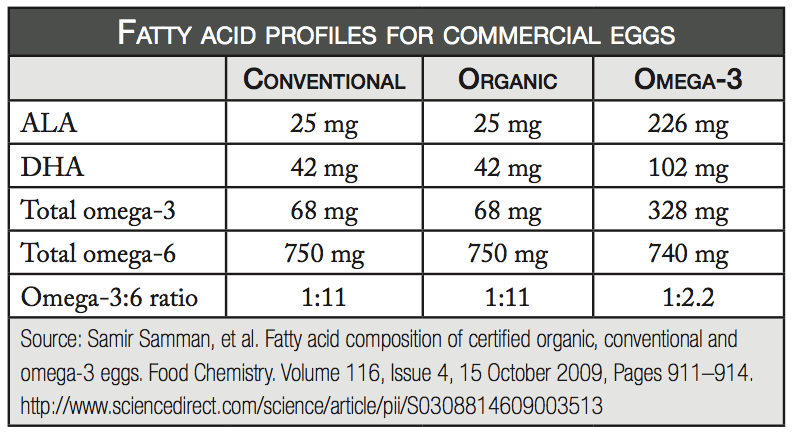It’s no secret that industrial food production has reduced the quality of the foods we eat. Omega-3 fatty acids, being easily perishable, have taken a particular beating. As the importance of these fats has become clearer, the food industry is scrambling to create omega-3 enriched foods. While I believe most of these efforts are pure marketing hype, omega-3 enriched eggs seem like a decent and worthwhile solution.
While humans have trouble converting ALA into DHA, hens do so quite effectively. And hens fed a diet rich in ALA produce eggs that have significantly more total omega-3 fats and DHA than hens fed a normal diet.
The October 2009 issue of Food Chemistry published a paper titled “Fatty acid composition of certified organic, conventional and omega-3 eggs“. The researchers bought a bunch of eggs from Sydney metropolitan area supermarkets and measured their fatty acid profiles. What I like about this study is that they didn’t get these eggs by feeding hens a special diet but rather used the same eggs we would find from supermarkets. Their idea was to compare the fatty acid profile of eggs based solely on the labeling on the packages. They chose ‘conventional’, ‘organic’, and ‘omega-3’ eggs.
Here’s the fatty acid profile for the different types of eggs, amounts given as per one large egg:

For all practical purposes, there was no difference in the fatty acid profiles of conventional and organically grown eggs; neither of which is a good source of omega-3 fats. The omega-3 enriched eggs, on the other hand, provide a decent helping of DHA and total omega-3 fats.
Unfortunately, there’s no mention of what the hens that laid the omega-3 eggs ate. Other studies have shown that hens fed a fish oil-enriched diet produce eggs with a higher DHA and EPA content, whereas hens fed a flax oil enriched diet produce eggs with a little bit less DHA and almost no EPA (source). I presume that the hens were fed a flax oil enriched diet. In another study in which the hens were fed such a diet produced eggs with 141 mg of DHA per egg. In yet another study in which the hens received a fish oil enriched diet, the eggs contained 263 mg of DHA and 50 mg of EPA.
These figures are quite similar to what you’ll get from most fish oil supplements (per pill, not per serving), except for the rather low amounts of EPA in omega-3 eggs. Fortunately, humans convert ALA into EPA far better than into DHA, so with a sufficient ALA intake, your body can produce enough EPA.
There have been studies that show quite remarkable changes in blood omega-3:6 ratio after consuming omega-3 enriched eggs. For example, The American Journal of Clinical Nutrition published a paper titled “Eggs enriched in w-3 (omega-3) fatty acids and alterations in lipid concentrations in plasma and lipoproteins and in blood pressure“.
In this study, the researchers asked the participants to consume either 4 omega-3 or 4 regular eggs per day for four weeks, while otherwise maintaining a normal diet. The eggs in this study were surprisingly high in DHA, but otherwise similar to what we’ve talked earlier.
Here are the results for people who consumed 4 omega-3 eggs per day, the numbers refer to blood concentrations of different fatty acids:
- ALA went from 0.1% to 0.9% (900% increase)
- EPA from 0.4% to 3.5% (875% increase)
- DHA shot from 3.8% to 8.9% (234% increase)
- Total omega 3 from 4.3% to 13.3% (up by 309%)
- Total omega 6 from 29.4% to 26.1% (11% drop)
- Omega 3:6 balance from 1:7 to 1:2
These factors lead to measurable health benefits, such as a drop in blood pressure and triglyceride levels (good for combating insulin resistance and hormonal acne).
Another study looked at the effect of eating one omega-3 egg per day for 24 weeks. During the study period, the omega 3:6 ratio went from 1:12 to 1:7, DHA blood levels increased by almost 200%, and EPA blood levels by 50%.
A 2000 review of enriched eggs as a source of omega-3 fats concluded that 3 enriched eggs provide as much omega-3 fats as a single meal of fatty fish.
